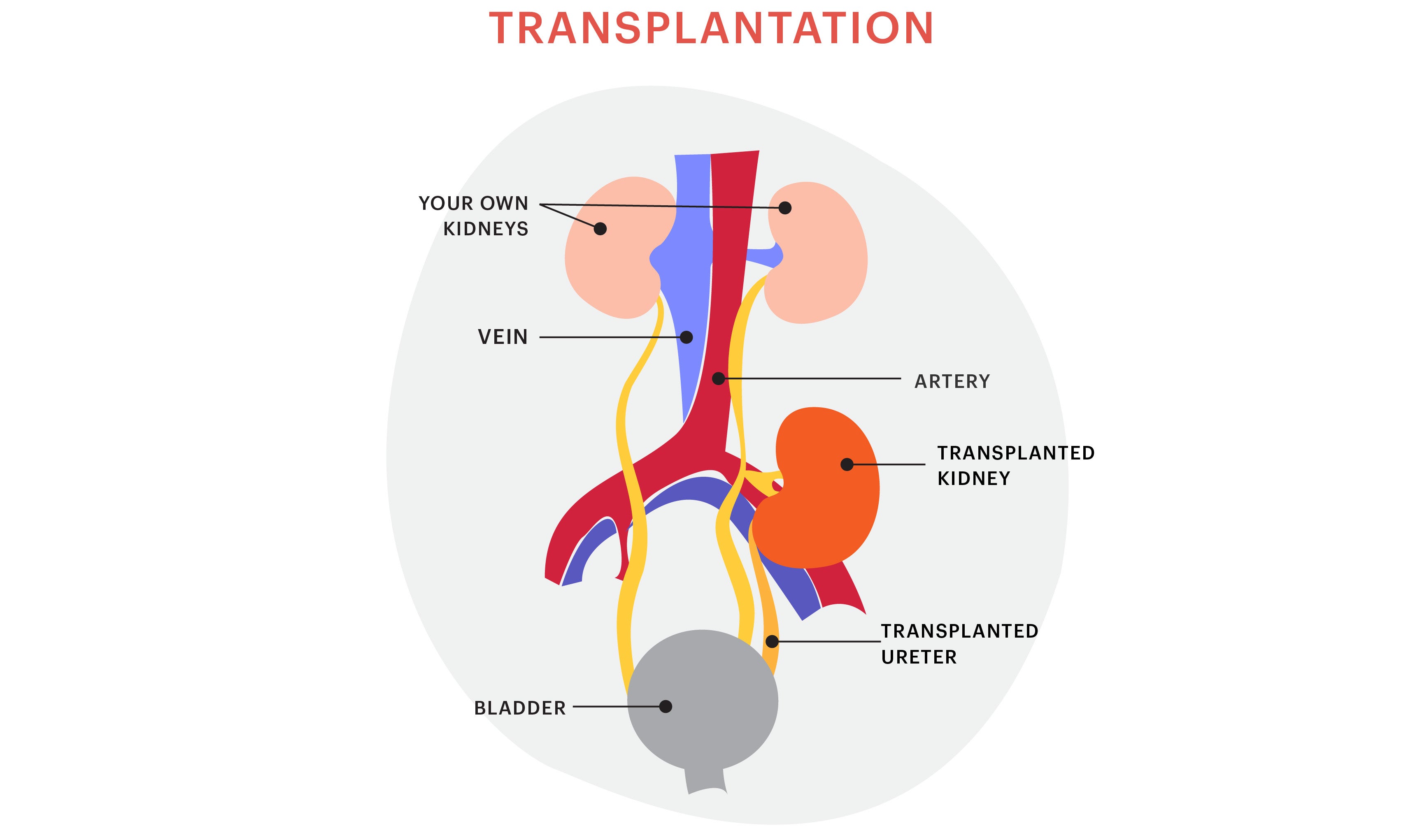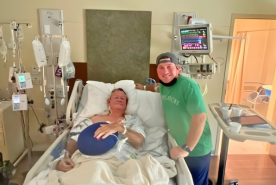Kidney Transplant Surgery
Kidney transplant surgery is the same for all kidney patients, whether you get a kidney from a living or a deceased donor. The evaluation process you go through before surgery helps make sure you are as healthy as possible. The surgery takes 3-4 hours. Most patients go home from the hospital in a less than a week, but there are many appointments after the surgery to make sure that you and your new kidney are doing well.
Before Surgery
If you get a kidney from a deceased donor, the transplant team will call you and say they’ve found a kidney for you. Once you agree to take that kidney, they’ll let you know when to come in to the hospital for surgery. If you have a living donor, you and your donor will be able to schedule your surgery date for a time that works for both of you.
Right before surgery, doctors will do some last-minute lab work (draw blood) to make sure you’re still healthy enough for surgery and can receive the new kidney.
You’ll be put to sleep with general anesthesia (similar to any other surgery.) Most transplant centers also give patients “pain blocks” before going into surgery, which means your belly area will be numb for 12-24 hours after. Doing this helps to lessen the amount of pain medication you’ll get after transplant and reduces the amount of pain you will be in, overall.
During Surgery
Kidney transplant surgery time is about 3-4 hours. The new kidney is placed into your lower abdomen (belly area), where it’s easiest to connect it to your important blood vessels and bladder. Your own kidneys generally aren’t taken out when you get a transplant. The surgeon leaves them where they are unless there is a medical reason to remove them. Each transplant surgery is a little different, but you can expect to have a 2.5-inch-long scar on one side of your abdomen.
Your health insurance will cover the cost of surgery and your stay at the hospital. Every health insurance plan is different, so talk to your transplant social worker or call your insurance company directly if you have any questions about your coverage.

Risks of Transplant Surgery
Just like having any other surgery, there are some risks to be aware of with transplant surgery. Some of the most common risks are:
- bleeding or getting an infection in the areas around the surgical area
- developing a hernia if you lift anything too heavy right after surgery
- getting a UTI, or Urinary Tract Infection. This can be caused from having a urinary catheter placed during surgery to allow your body to urinate (pee) while you're in surgery and under anesthesia
Though there are risks, most patients do very well with this surgery. The survival rate for kidney transplant surgery is 98-99%, making it a very safe treatment option.
Recovering from Surgery
After surgery (also called “post-op”) you’ll be sore at first. Most patients are out of bed in a day or so, and go home from the hospital within a week. While you’re still in the hospital recovering, a nurse will teach you and your care partner (caregiver) about the medications you’ll have to take, when and how to take them, and their side effects. This is one of the many reasons why it’s important to have a care partner with you after surgery. As you are recovering, you might find it difficult to remember all of the important information about taking your medications correctly.
You’ll also learn about how your diet may change after transplant. If you’ve been on dialysis, you’ll find that there are fewer limits on what you can eat and drink, which is one of the benefits of a transplant. You will want to eat a healthy diet and exercise to take good care of your body and your new kidney.
Delayed Graft Function
For kidneys from deceased donors, it is common for the new kidney to take a little while to start working, or “wake up.” This is called Delayed Graft Function (DGF). If you have DGF, you may need to be on dialysis for a short amount of time until your kidney begins to work, which is usually for about two to four weeks. The majority of kidneys with DGF end up being successful kidney transplants.
Follow-Up
After you have your transplant surgery, one of the most important jobs you’ll have is making sure you go to your follow-up appointments at your transplant center. At these visits, you’ll have lab work done to make sure your medications (immunosuppressants and other medications) are keeping your body from rejecting (or hurting) your new kidney and that your kidney is working well. These visits also give your team the chance to adjust the medications you’re taking based on your lab results.
Every transplant center has a different follow-up schedule, but you can expect to follow a similar schedule after getting a transplant:
2-3 times each week
1-2 times each week
1 time every 2 weeks
1-2 times each month
1 time a month
Your team will also talk to you about the warning signs of rejection so that you can let them know right away if you have any of the symptoms.
Getting Back to Regular Living
Once you get your new kidney, your life may change a lot and be more like life before you had kidney failure. It’s very important to keep up with your other routine healthcare needs, like going to your annual visits with your regular doctor, eye doctor, and the dentist.
To learn more about life after kidney transplant, visit Life with a Kidney Transplant.
Questions for Your Healthcare Team
- What is kidney transplant surgery like at your center?
- What should I be prepared for after I get called for a kidney?
- How long do you think I will be in the hospital?
- What kind of help will I need after surgery?
- What can I expect for follow-up appointments after surgery?



















